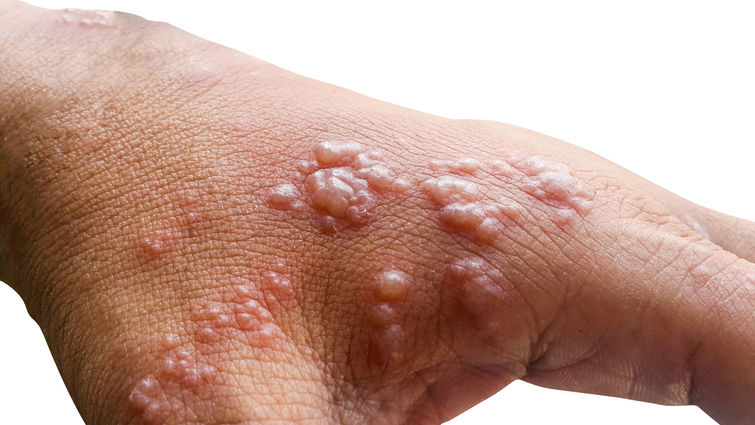
Early symptoms of monkeypox will be followed by a rash of fluid-filled blisters in one to three days. Learn more about monkeypox vaccines below.
Monkeypox is a rare viral illness related to smallpox that was first discovered in 1958. There have been infrequent periodic outbreaks since its discovery, and it rarely travels outside of the African continent. There is currently an international Monkeypox outbreak with a case recently reported in California. Jennifer Veltman, MD, director of infectious diseases at Loma Linda University Health, provides insight on transmission, symptoms and who is at risk.
How is monkeypox contracted?
Monkeypox persists in African monkey and rodent populations, but occasionally through bites or contact with infected animals can pass to humans. Once a human is infected, they can spread it to other humans through contact with body fluids, touching the body sores, or through respiratory droplets. If fluid from the sores or a cough land on environmental surfaces like sheets or countertops, monkeypox can also be spread if someone touches those surfaces and then touches their eyes or mouth without washing their hands first.
What are the symptoms?
Early symptoms include:
- Fever
- Headache
- Muscle/backaches
- Swollen lymph nodes
- Chills
- Exhaustion
A rash will follow some or all the above symptoms in one to three days. The rash usually begins on the face, then spreads to the rest of the body and starts with a red bump that turns into what looks like a fluid-filled blister.
Unlike COVID-19, monkeypox is transmitted after symptoms have developed, not during the pre-symptomatic stage, making it easier to prevent transmission to others.
Who is at risk?
Recent international travelers are at the highest risk. Those who have traveled to the locations currently experiencing outbreaks include the Canary Islands, Spain and Belgium.
International travelers recently in endemic countries are also at risk. Endemic countries include the following: Benin, Cameroon, the Central African Republic, the Democratic Republic of the Congo, Gabon, Ghana, Ivory Coast, Liberia, Nigeria, the Republic of the Congo, Sierra Leone, and South Sudan.
Individuals who have engaged in anonymous sex are also at high risk. While monkeypox is not a sexually transmitted disease, monkeypox transmits through contact with infectious body fluids.
What do I do if I’m in close contact with someone with monkeypox?
If you were in close contact with someone who is confirmed to have monkeypox, you should monitor yourself for symptoms for 21 days after your last exposure. If symptoms develop, you should self-isolate and call the health department. Contacts who remain asymptomatic should not donate blood, cells, tissue, breast milk, semen, or organs while under symptom surveillance but can continue routine daily activities.
Smallpox vaccine influences
The smallpox vaccine can protect people from contracting monkeypox because the two viruses are closely related. Many of the world population has some pre-existing immunity to monkeypox influenced by past smallpox vaccinations. Due to the eradication of smallpox and the end of the smallpox vaccination program, younger individuals are now more vulnerable to monkeypox.
Veltman says monkeypox is serious and can be dangerous if not identified and monitored. According to the CDC, monkeypox killed 1-10% of people infected among those living in remote and medically underserved communities.
“At LLUH, we are monitoring the situation closely," Veltman says. "Should vaccination become needed in our community, we are ready to respond using many of the same tools we have practiced through our recent experience with COVID-19."
Monkeypox vaccines are now available through the San Bernardino County Department of Public Health. This survey must be completed to determine eligibility due to limited supplies.
If you are concerned you or a loved one have contracted monkeypox, Loma Linda University Health Primary Care and Urgent Care locations are available for in-person or virtual visits. Appointments can be made quickly and easily online at MyChart or by calling 909-303-9939.
